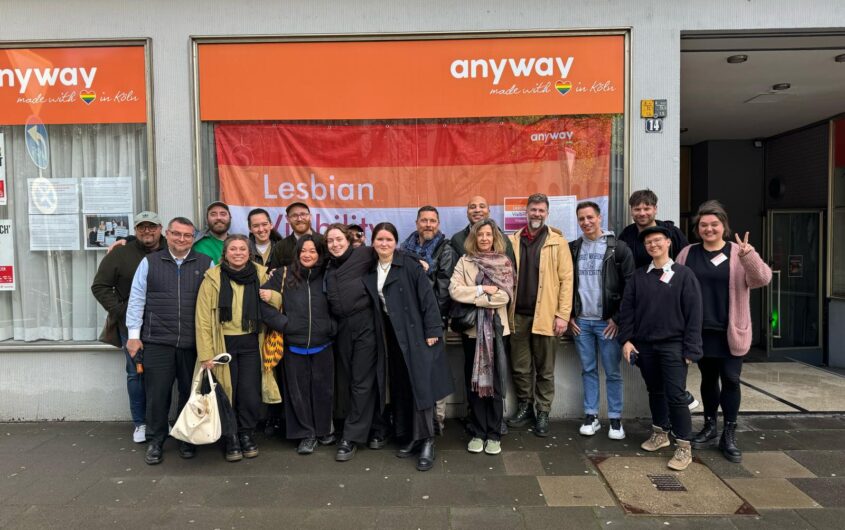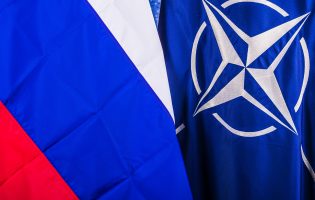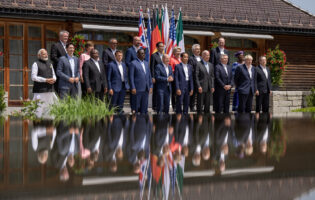
Building LGBTQ+ Communities in Germany and the United States: Past, Present, and Future
Year 1: Cologne, North-Rhine Westphalia, Germany
LGBTQ+ individuals and their communities have been organizing to assert their rights for over a century, especially in Germany and the United States—two countries that were early pioneers and that have currently achieved more equality than many other places. But many challenges still persist, especially as a backlash to greater LGBTQ+ rights has been visible in both countries.
A comparative examination of the history, present, and future of LGBTQ+ rights will generate new understandings, leadership skills, and policy lessons for both countries and many others around the world. This AGI project fosters cross-cultural exchange with participants from diverse backgrounds by sharing personal testimonies, successes and failures, and best practices through week-long study tours in the United States and Germany.
Program Synopsis
MdB Nyke Slawik
Nyke Slawik, a Green Party member of the Bundestag representing North Rhine-Westphalia, is one of the first two openly transgender legislators in the German Federal government. Throughout her tenure, Slawik has been an advocate for policies that support the LGBTQ+ community and the advancement of anti-discrimination protections in Germany.
A significant milestone for LGBTQ+ rights in Germany occurred in April 2024 with the passage of the Selbstbestimmungsgesetz, or Self-Determination Law. This legislation represented a crucial step forward in dismantling the restrictive laws surrounding gender identification changes. By eliminating the previous requirement for psychological evaluations, the law now allows individuals to self-disclose their gender identity, marking a significant victory in the fight against discrimination and bureaucratic hurdles for transgender folks.
However, while the 2024 Self-Determination Law addressed some key issues, it fell short of addressing all historical injustices. Notably, it did not address the forced sterilization of transgender and non-binary individuals under the overturned Transexual Act of 1981. Many supporters, including Slawik, expressed disappointment that the legislation did not include provisions for compensating victims of this former policy. Nevertheless, legislators remain committed to expanding LGBTQ+ protective policies to address these concerns in the future.
In addition to her advocacy for LGBTQ+ rights, Slawik’s work extends to other critical areas, particularly environmental and transportation policies. As a member of the Green Party, she has been a vocal proponent of positive climate policies and public transportation initiatives. Notably, Slawik played a key role in advocating for the Deutschlandticket, a 49-euro ticket subscription for all local public transportation across Germany. Introduced by the SPD-FDP-Green governing coalition, this program has been widely viewed as a significant advancement for public transportation, providing greater mobility opportunities for individuals without access to private vehicles.
rubicon e.V.
Established in 1975, rubicon e.V. is one of Germany’s largest LGBTQ+ counseling organizations, boasting a team of thirty dedicated employees. Based in Cologne, rubicon offers a comprehensive range of services aimed at supporting the mental health and physical well-being of LGBTQ+ individuals and families.
The organization’s extensive service portfolio includes anti-violence initiatives, migration assistance, elder care, family counseling, and educational support. Notably, rubicon distinguishes itself from similar organizations in the United States by securing government funding, evenly distributed between the city of Cologne and the state of North Rhine-Westphalia.
A significant aspect of rubicon’s work revolves around supporting LGBTQ+ refugees, a population often marginalized and facing hostility in their home communities. With Germany hosting an estimated 2 million refugees as of 2022, rubicon plays a vital role in providing counseling, housing assistance, and support in obtaining documentation for LGBTQ+ refugees resettling in Cologne.
Moreover, rubicon actively engages in community outreach and public service projects. The organization has conducted gender diversity training for the police force and spearheaded awareness campaigns addressing violence against queer individuals in Cologne and beyond.
Centrum Schwule Geschichte e.V.
The Centrum Schwule Geschichte e.V., or Center for Gay History, serves as a vital archive and library of LGBTQ+ materials for the city of Cologne and Germany as a whole. Established in 1984, it is one of Germany’s oldest LGBTQ+ archives alongside counterparts in Berlin and Munich, dedicated to preserving significant artifacts and materials that are relevant to LGBTQ+ heritage. With only one paid staff member, the Center relies heavily on volunteers from the wider community for its operations. While the city of Cologne funds the space it occupies, it does not provide financial support for personnel to maintain the collection.
Regularly engaging in research, exhibitions, and community tours, the Centrum Schwule Geschichte collaborates with organizations like the Frauen Geschichte Verein (Women’s History Organization) on various projects and events, including participation in Cologne Pride. Additionally, the Center periodically publishes magazines highlighting current preservation work, community stories, and upcoming activities. The Center also participates in annual conferences across German-speaking Europe, fostering the exchange of ideas and best practices for itself and organizations with similar missions. By partnering with the Queers Forum in Munich, the archive has transitioned from a specifically gay men’s archive to a more inclusive LGBTQ+ archive, aligning with its long-standing goal of inclusivity.
The archive and library serve as invaluable resources for university scholars, housing notable works from Magnus Hirschfeld, founder of the Institute for Sexual Science, whose institute fell victim to Nazi looting and destruction. The Center serves as a crucial hub for preserving LGBTQ+ materials from the lengthy period when Germany’s Paragraph 175 criminalized homosexual acts, enabling discrimination against gay men, particularly during the Nazi regime.
A significant goal for the Center is to establish an archive dedicated to preserving transgender and non-binary-related materials. While facing challenges due to the scarcity of such materials compared to those related to the gay community, this objective remains a top priority, recognized as a crucial preservation measure for transgender and non-binary individuals. Through its efforts, the Centrum Schwule Geschichte continues to uphold LGBTQ+ history and memory, ensuring that the voices and experiences of marginalized communities are preserved and celebrated for generations to come.
German Council of Bishops Queer Pastoral Care
Emerging from the German Catholic Church’s response to the AIDS crisis in major cities like Frankfurt, Munich, and Berlin during the 1990s, the German Council of Bishops Queer Pastoral Care is a vital effort to provide support for LGBTQ+ individuals within the Church. Initially focused on care for AIDS victims, this pastoral initiative has evolved to address broader issues of inclusion and support for LGBTQ+ members. Despite progress, challenges persist within the Church, with only 20 out of 27 German dioceses currently having designated points of contact for Queer Pastoral Care.
The central goal of this work is to develop educational programs rooted in theological interpretation, aimed at providing meaningful support to LGBTQ+ individuals while respecting the tenets of the Church’s doctrine. However, these efforts often face resistance, particularly from more conservative elements within the Church hierarchy.
Queer Pastoral Care encompasses a range of essential services that might otherwise be inaccessible to LGBTQ+ members of the Church. These services include grief counseling, conducting inclusive liturgies, and advocating for more inclusive policies within the Church’s hierarchy. In a landscape where controversy persists, Queer Pastoral Care leaders strive to facilitate dialogue and bridge-building efforts between LGBTQ+ Catholics and conservative Church leadership.
By fostering conversations and advocating for greater understanding and acceptance, the German Council of Bishops Queer Pastoral Care seeks to create a more inclusive and supportive environment within the Catholic Church, ensuring that LGBTQ+ individuals feel valued and respected within their faith community.
First Vice Mayor Andreas Wolter
As one of Germany’s major cities, Cologne maintains a network of sister cities with which its mayoral office engages in exchanges and collaborations. First Vice Mayor Andreas Wolter plays a crucial role in these initiatives, often traveling to sister cities to foster relationships and support LGBTQ+ communities, even in regions where local policies may be discriminatory or exclusive toward LGBTQ+ residents. Over the past four decades, attitudes in Germany have undergone significant positive changes toward LGBTQ+ people, leading to a transformation in the nature of sister city exchanges, with advocacy for LGBTQ+ rights now at the forefront of discussions.
Before the outbreak of conflict in Ukraine, First Vice Mayor Wolter engaged with Volgograd, a city with an underground LGBTQ+ scene that is considered taboo in Russia. This exchange has been put on hold since the conflict began in 2022.
In response to the 2022 Russian invasion of Ukraine, Cologne welcomed approximately 12,500 refugees, many of whom identify as LGBTQ+. With 95 percent of refugees to Cologne being women and youth, the city has had to develop programs to accommodate this influx of people. Fortunately, LGBTQ+ refugees have been able to benefit from Cologne’s robust support for LGBTQ+ individuals, with children having access to schooling with an inclusivity program and young adults receiving health care aimed at providing services for LGBTQ+ folks.
LGBTQ+ organizations in Cologne, spanning gay, lesbian, non-binary, and transgender communities, collaborate cooperatively and share resources provided by the city to support one another. Unlike in the United States, German communities have a culture of allocating public funds for civil society organizations, making the fight for public funding less challenging. Cologne and Germany at large have a donation culture that bolsters programs.
Organizations seeking funding from the city for projects collaborate with the city council’s working groups to analyze issues and draft proposals for committees. These policies are then nominated by other organizations and voted on by nine deputies. In Cologne, like most of Germany, LGBTQ+ advocacy intersects with climate issues and climate-positive groups effectively mobilizing other community groups, including gay men, feminist groups, lesbians, and trans groups, to support climate action initiatives. This collaborative approach underscores Cologne’s commitment to fostering a more inclusive and sustainable community for all its residents.
LSVD+ – Verband Queere Vielfalt
Originating as the Schwule Verband (Gay Association) in the former German Democratic Republic, the LSVD+ – Verband Queere Vielfalt (Federation Queer Diversity) expanded its reach into West Germany following reunification in 1990. Rooted in the Protestant Church, the association emerged with a clear mandate—to advocate for gay rights through lobbying efforts at both federal and regional levels of government. Working in fourteen out of the sixteen German federal states, the LSVD+ has been instrumental in shaping LGBTQ+ legislation and policy in Germany.
A cornerstone of the LSVD+’s advocacy work was its role in helping to secure civil partnership recognition in 2001, a significant milestone for LGBTQ+ rights in Germany. Subsequently, the organization played a key role in the landmark 2017 marriage equality vote, which granted civil unions the same legal standing as heterosexual marriages under German law.
In the interest of global advocacy, the LSVD+ established the Hirschfeld-Eddy Foundation, named in honor of Sierra Leonean gay rights activist FannyAnn Eddy, who was tragically murdered in 2004. Operating as a dependent project of the LSVD+, the Foundation focuses on extending support to the Global South and Eastern Europe, particularly targeting queer refugees in these regions. Its initiatives aim to provide counseling, establish networks of competencies, and conduct sensitivity training on LGBTQ+ issues for government offices, trade unions, and political parties.
Central to the Hirschfeld-Eddy Foundation’s mission is the recognition of the colonial past and the promotion of sensitivity toward the LGBTQ+ community in civil society. Through projects funded by the German government, the Foundation seeks to engage with other governments and private organizations in Africa and Eastern Europe, opening avenues for financial support opportunities and ultimately benefiting LGBTQ+ individuals in these regions. In doing so, the LSVD+ and the Hirschfeld-Eddy Foundation continue to champion LGBTQ+ rights on a global scale, embodying a commitment to building a safer world for LGBTQ+ people.
Anyway e.V.
Established in 2012 as an LGBTQ+ youth club in Cologne, Anyway e.V. has evolved into a pivotal organization, recognized and funded by the state of North Rhine-Westphalia. With an impressive monthly attendance averaging 180 participants, Anyway serves as a vibrant hub for LGBTQ+ individuals under 27, attracting both local Cologne residents and visitors from across Germany and German-speaking Europe.
Anyway offers a diverse range of regular activities tailored to different identities within the LGBTQ+ community, ensuring inclusivity and representation. From themed evenings to group excursions across North Rhine-Westphalia, Germany, and beyond, Anyway fosters a supportive environment for personal growth and community bonding.
Beyond providing a space for social interaction, Anyway is committed to supporting the well-being of LGBTQ+ youth through professional counseling services. Their team of experienced professionals addresses issues such as queerphobia, professional development for youth, and emotional well-being, offering invaluable support to those in need.
Anyway is also deeply involved in educational initiatives, with over 100 workshops conducted in community schools in 2023 alone. Their flagship program, “WiR*: Wissen ist Respekt” (Knowledge is Respect), launched in 2016, aims to raise awareness of diversity in sexuality and gender among students. Through this program, participants share experiences of discrimination, highlighting the disproportionate impact on LGBTQ+ youth and advocating for preventive measures in academic institutions.
Furthermore, Anyway collaborates with businesses in North Rhine-Westphalia through mentoring and coaching programs. These initiatives, spanning at least six months, help community leaders recognize and integrate intersectional perspectives, fostering a more inclusive and equitable environment for all. Anyway e.V. stands as a beacon of empowerment, advocacy, and support for LGBTQ+ youth, making significant strides in promoting acceptance and inclusion across Cologne.
Deutsche AIDS Stiftung
Established in 1987 by Rainer Ehlers, an openly gay pastor from Hamburg, the German AIDS Foundation (Deutsche AIDS Stiftung) has been an advocate for individuals affected by HIV/AIDS. Initially founded with private funds while Ehlers provided pastoral care in Cologne, the organization’s mission has remained focused on improving the living conditions and bolstering the self-confidence of HIV-positive individuals, enabling them to lead meaningful and socially accepted lives.
Originating from the Deutsche Aidshilfe (German AIDS Help), which provided health services in major German cities, the Foundation expanded its reach by merging with the National AIDS Foundation in 1988 that had been under the leadership of former Minister of Health Rita Süssmuth. This strategic consolidation allowed for more effective resource allocation and enhanced support for those grappling with the disease.
In response to the evolving understanding of HIV/AIDS and its impact on diverse communities, the Foundation shifted its focus to operate in solidarity with the broader LGBTQ+ community and all individuals affected by the epidemic. Through targeted educational campaigns and support for healthcare services, the Foundation strives to raise awareness and combat the stigma surrounding HIV/AIDS.
Since its inception, the German AIDS Foundation has relied on support from private companies and individuals to fund vital initiatives. The Foundation’s annual gala at the Berlin Opera has become a highly regarded event, raising significant funds—up to one million euros annually—for the cause. Additionally, the Foundation pioneered the concept of art exhibition fundraisers, further engaging the community in its mission.
Remarkably, 80 percent of donations come from individual contributors, underscoring the deep commitment of the community to advancing research, healthcare, and awareness efforts in Germany. The German AIDS Foundation continues to play a pivotal role in empowering lives and advocating for change, demonstrating unwavering dedication to its mission of supporting those affected by HIV/AIDS.
EL-DE Haus & Memorial to Gay and Lesbian Victims of National Socialism
The EL-DE Haus in Cologne’s old town is a testament to the horrors of the Third Reich, serving as the city’s National Socialist Documentation Center and museum. Originally the Gestapo headquarters from 1934 to 1945, this historic site bears witness to the brutalities inflicted upon Nazi-designated “undesirables” during that dark period of history.
Among the groups targeted by the Nazi regime were the LGBTQ+ community, alongside Jewish, Sinti, and Roma populations, political dissenters, and many others. Notably, the persecution experienced by lesbians and gay men differed significantly. Lesbian women were often labeled as “asocial,” alongside prostitutes and career criminals, and were subsequently imprisoned. Gay men on the other hand faced a more immediate fate, often being sent directly to concentration camps.
The EL-DE Haus sheds light on the persecution endured by gay men during the Nazi era, a topic often underrepresented at Nazi documentation sites. The scarcity of testimonies on this subject is attributed to various factors, including the harsh anti-gay criminal code, Paragraph 175, which was strengthened by the Nazi regime. This law facilitated the persecution of gay men without requiring substantial evidence. Although enforcement of Paragraph 175 waned after the Nazi era, it remained in effect for decades, potentially silencing many who suffered under Nazi persecution. This has unfortunately made commemoration and testimony preservation challenging.
By acknowledging and contextualizing the injustices faced by LGBTQ+ individuals during the Third Reich, the EL-DE Haus offers visitors a comprehensive understanding of the diverse experiences of those persecuted by the Nazi regime, ensuring that their stories are not forgotten. In addition to the Memorial to Gay and Lesbian Victims of National Socialism, both serve as an example of the city of Cologne’s solidarity with the LGBTQ+ community. Dedicated in 1995, the memorial represents the pink triangle homosexual prisoners in concentration camps were forced to wear. Together, these monuments stand as poignant reminders of past atrocities and the ongoing commitment to remember and honor the victims of discrimination and violence.
This program is generously funded by the Transatlantik-Programm der Bundesrepublik Deutschland aus Mitteln des European Recovery Program (ERP) des Bundesministeriums für Wirtschaft und Klimaschutz(BMWK) (Transatlantic Program of the Federal Republic of Germany with Funds through the European Recovery Program (ERP) of the Federal Ministry for Economics and Climate Action (BMWK)), the AGI Harry & Helen Gray Humanities Program and funds from The German Marshall Fund of the United States (GMF).







